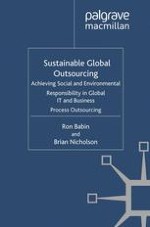2012 | Buch
Sustainable Global Outsourcing
Achieving Social and Environmental Responsibility in Global IT and Business Process Outsourcing
verfasst von: Ron Babin, Brian Nicholson
Verlag: Palgrave Macmillan UK
Buchreihe : Technology, Work and Globalization
